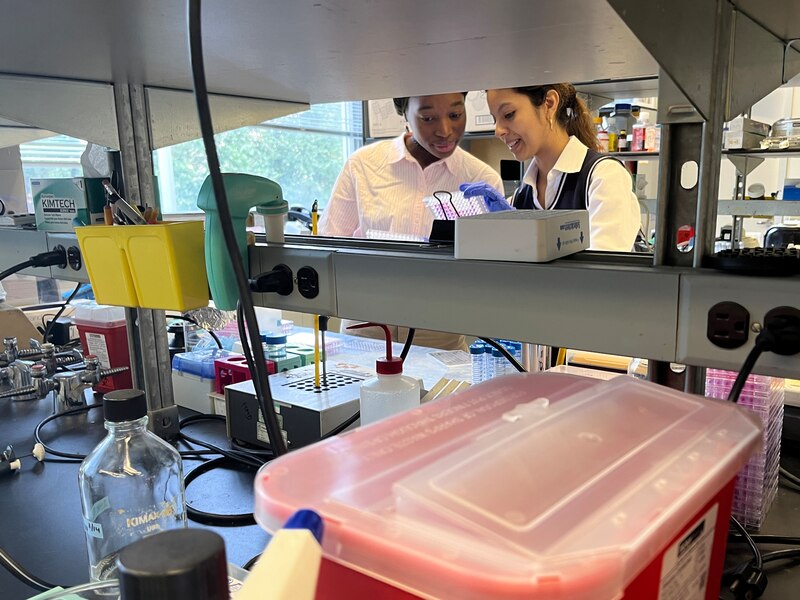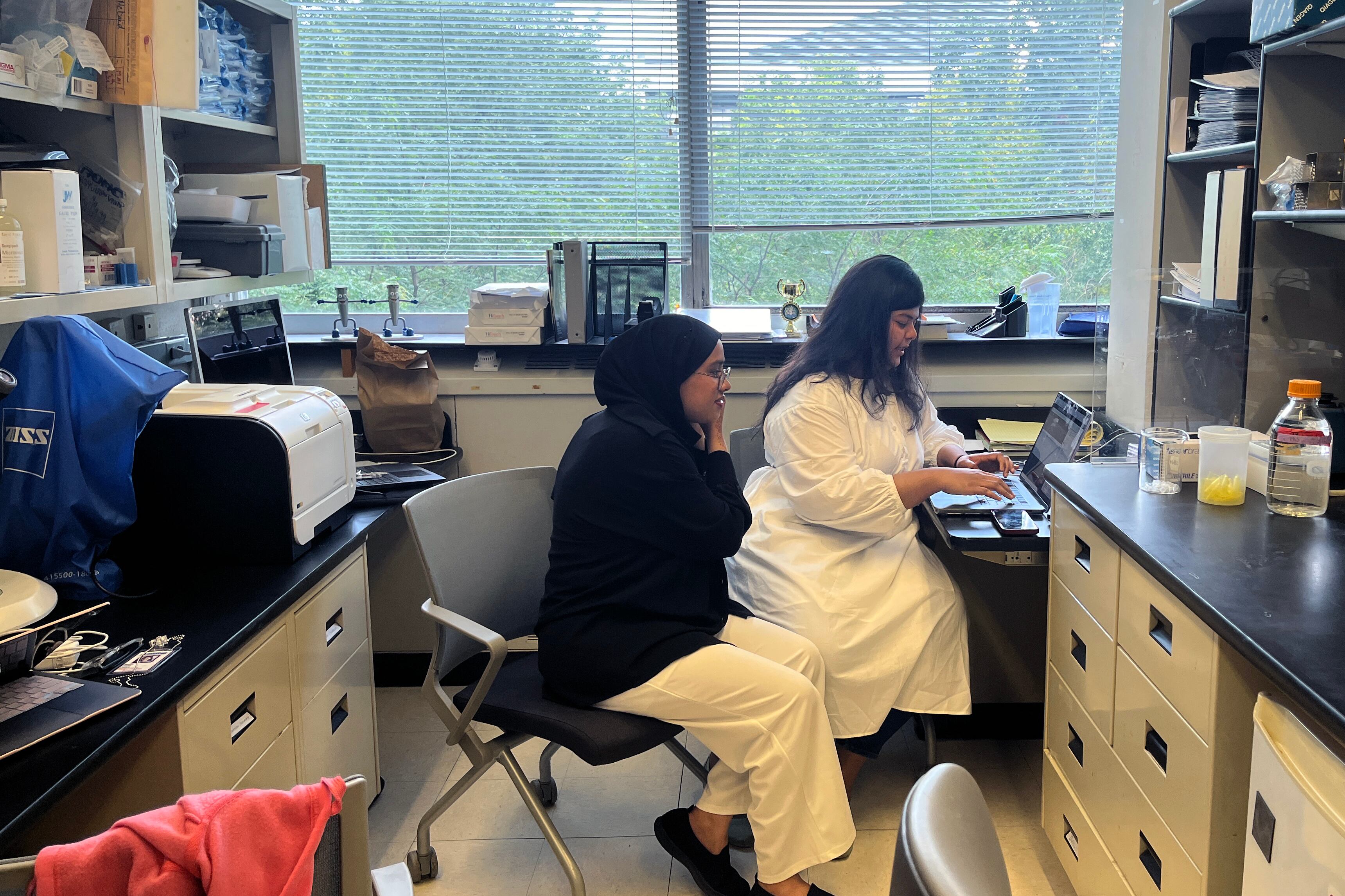Sign up for Chalkbeat New York’s free daily newsletter to keep up with NYC’s public schools.
Sumaiya Jessi, a rising senior at the Bronx High School of Science, was searching for summer opportunities that would help her pursue a career in medicine when she came across a program at the Albert Einstein College of Medicine.
Now, as the new academic year approaches, she’ll return to school with weeks of research experience behind her. For two months, Jessi worked in a lab at the Montefiore Einstein Comprehensive Cancer Center studying dormant lung cancer cells to help with earlier detection and more effective treatment for patients who experience relapse.
She’s had the chance to conduct cell culture work, analyzing how different drugs are used to treat cancer cells, all while earning a stipend of $2,500. And although Jessi hopes to attend medical school after graduating from college, she said it’s been “eye-opening” to see how the disease is studied through an academic lens.
“It’s really interesting to see how the textbook knowledge applies here, and how they’re able to create these treatments that are eventually given to patients,” Jessi said.
Researchers encourage students to ask questions
Jessi is one of 15 Bronx high schoolers helping with cancer research at Einstein College this summer. The BEYOND ALBERT program, which is supported by the Montefiore School Health Program and the Pinkerton Foundation, allows these students to earn a stipend while experiencing hands-on lab work and attending workshops to help prepare them for careers in academia and medicine. (The Pinkerton Foundation also supports Civic News Company. Learn more about our funding here.)
Since 2022, the program has helped local high school students get their foot in the door of careers in scientific research, offering students 40 hours each week, split between research in labs, scientific workshops, and other professional and academic development experiences.
The program is open to Bronx students who are rising juniors or seniors and who are at least 16 years old, according to Kristina Ames, assistant director for Cancer Research Training and Education Coordination at the Cancer Center. There are no prerequisite classes, Ames added, and the program is open to any student with a deep interest in science and a willingness to learn.
Over the past year, the program has more than doubled, growing from seven high school students in 2023. The 15 students this summer were each placed in a different lab at the Cancer Center, Ames added.
Hayley McDaid, an associate professor of oncology, medicine, and molecular pharmacology at Einstein College who oversees the lab where Jessi worked, said she hopes local students who come through the program will benefit from their exposure to science.
“In the Bronx, sometimes these opportunities don’t exist,” she said. “As a medical school and research center in the Bronx, it’s incredibly important that they’re able to appreciate what we do, experience it firsthand, and experience the joy of science.”
She added it’s critical to take a one-on-one approach with students, meeting them where they are as they enter the program and walking them through cancer terminology with simple, real-world explanations.
“What I’ve learned over the years mentoring students is not to assume they know what you’re talking about, because quite frankly, they won’t feel safe when they come in to say, ‘I don’t understand what that means,’” she said. “They feel that they have to be perfect at that stage in their education.”
This year, McDaid noted her lab paired its high school and undergraduate students with mentors attending graduate school, hoping that bonds between students would allow mentees to feel comfortable asking for help when they encountered subjects or terms they didn’t understand. For Jessi, that approach appears to have been successful.
“The biggest thing I’ve learned from this experience is not being afraid to ask questions,” Jessi said. “Growing up, for me, asking questions was always a sign that you don’t understand something you’re supposed to, or that you’re falling behind. Just being able to explore my curiosity and use my voice to ask questions and learn more about the world around me — it’s been really eye-opening and inspirational.”
Bronx program offers glimpse at scientific research careers
For Diana Plaza, a rising sophomore at Fordham University who participated in the BEYOND ALBERT program while attending high school in the Bronx, working in an Einstein lab helped her prepare to study science in college by giving her experience writing academic papers and presenting her research findings.
“Usually, these opportunities are found in other boroughs, like Manhattan or Brooklyn or Queens,” said Plaza, who attended the Bronx Academy of Health Careers. “It felt really nice to have a program here in the Bronx that gave us an opportunity to show our talents.”
This summer, Plaza returned to Einstein College, working alongside her mentor Gracia Bualuti, an M.S. candidate at Lehman College, to study how air pollutants affect the development of lung cancer in cells. Plaza’s experiences at Einstein in high school and as an undergraduate have helped solidify her plans beyond her undergraduate studies, she added.
“Until this program, I didn’t realize that research was an option for me,” she said. “I thought that everything science had to be medical. Once I started doing this program, and I realized that this was more focused on knowledge and understanding and developing the field, then I realized that I actually liked doing this type of work more than being on the medical side.”
To Plaza, the work was also personal, as her mother was diagnosed with breast cancer prior to Plaza’s time in the BEYOND ALBERT program. Though she recovered, her mother was recently diagnosed with uterine cancer, Plaza added.
“I just feel grateful that I’m pushing the field forward so that these things can happen less in the future,” she said.

How the lab prepares students for graduate school and beyond
Nazia Jamil, a Ph.D. student in the lab and Jessi’s mentor for the summer, noted opportunities like the BEYOND ALBERT program weren’t around when she was younger. Jamil, who moved from Bangladesh to New York City as a teenager, graduated from John Adams High School in Queens.
“These kids, eventually, they’ll go to apply for graduate school, and this research will help them be a strong applicant,” she said. “I lacked those opportunities, and it was a really hard struggle. But obviously time is evolving, and it’s getting even more competitive, so they definitely need this kind of exposure.”
The experience has not only given Jessi a new perspective on the future, but also a supportive community.
“I’ve always thought of the science field as isolating,” she said. “But this is like a second home, and I love coming in every day.”
Jessi, who was born in Bangladesh and whose parents never attended college, added that the relationships she’s formed and the research she’s conducted have offered further insight into what a career in the sciences might look like.
“Being here, surrounded by so many motivating women who have accomplished so much, has been truly inspiring,” she said. “A Ph.D. was never something I knew much about, and just getting to explore that this summer has in some ways really opened up different pathways for me to consider.”
Julian Shen-Berro is a reporter covering New York City. Contact him at jshen-berro@chalkbeat.org





